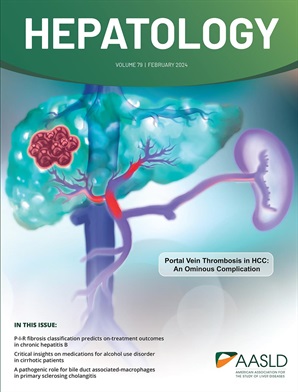Harnessing ZIKV NS2A RNA for alleviating acute hepatitis and cytokine release storm by targeting translation machinery.
IF 12.9
1区 医学
Q1 GASTROENTEROLOGY & HEPATOLOGY
引用次数: 0
Abstract
BACKGROUND AND AIMS Hyperactivated inflammatory responses induced by cytokine release syndrome (CRS) are the primary causes of tissue damage and even death. The translation process is precisely regulated to control the production of proinflammatory cytokines. However, it is largely unknown whether targeting translation can effectively limit the hyperactivated inflammatory responses during acute hepatitis and graft-versus-host disease (GVHD). APPROACH AND RESULTS By using in vitro translation and cellular overexpression systems, we have found that the non-structural protein gene NS2A of Zika virus (ZIKV) functions as RNA molecules to suppress the translation of both ectopic genes and endogenous proinflammatory cytokines. Mechanistically, results from RNA pulldown and co-immunoprecipitation (Co-IP) assays have demonstrated that NS2A RNA interacts with the translation initiation factor eIF2α to disrupt the dynamic balance of the eIF2/eIF2B complex and translation initiation, which is the rate-limiting step during the translation process. In the acetaminophen (APAP)-, LPS/D-galactosamine (D-GalN)-, viral infection-induced acute hepatitis, and GVHD mouse models, mice with myeloid cell-specific knock-in of NS2A show decreased levels of serum proinflammatory cytokines and reduced tissue damage. CONCLUSIONS ZIKV NS2A dampens the production of proinflammatory cytokines and alleviates inflammatory injuries by interfering translation process as RNA molecules, which suggests that NS2A RNA is potentially used to treat numerous acute inflammatory diseases characterized by CRS.以翻译机制为目标,利用 ZIKV NS2A RNA 缓解急性肝炎和细胞因子释放风暴。
背景和目的细胞因子释放综合征(CRS)诱发的过激炎症反应是造成组织损伤甚至死亡的主要原因。翻译过程受到精确调控,以控制促炎细胞因子的产生。方法与结果通过使用体外翻译和细胞过表达系统,我们发现寨卡病毒(ZIKV)的非结构蛋白基因 NS2A 可作为 RNA 分子抑制异位基因和内源性促炎细胞因子的翻译。从机理上讲,RNA pulldown 和共免疫沉淀(Co-IP)测定的结果表明,NS2A RNA 与翻译起始因子 eIF2α 相互作用,破坏了 eIF2/eIF2B 复合物和翻译起始的动态平衡,而翻译起始是翻译过程中的限速步骤。在对乙酰氨基酚(APAP)、LPS/半乳糖胺(D-GalN)、病毒感染诱发的急性肝炎和 GVHD 小鼠模型中,髓系细胞特异性敲除 NS2A 的小鼠显示血清促炎细胞因子水平降低,组织损伤减轻。结论 ZIKV NS2A 通过干扰 RNA 分子的翻译过程,抑制促炎细胞因子的产生并减轻炎症损伤,这表明 NS2A RNA 有可能用于治疗以 CRS 为特征的多种急性炎症性疾病。
本文章由计算机程序翻译,如有差异,请以英文原文为准。
求助全文
约1分钟内获得全文
求助全文
来源期刊

Hepatology
医学-胃肠肝病学
CiteScore
27.50
自引率
3.70%
发文量
609
审稿时长
1 months
期刊介绍:
HEPATOLOGY is recognized as the leading publication in the field of liver disease. It features original, peer-reviewed articles covering various aspects of liver structure, function, and disease. The journal's distinguished Editorial Board carefully selects the best articles each month, focusing on topics including immunology, chronic hepatitis, viral hepatitis, cirrhosis, genetic and metabolic liver diseases, liver cancer, and drug metabolism.
 求助内容:
求助内容: 应助结果提醒方式:
应助结果提醒方式:


